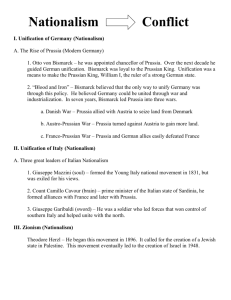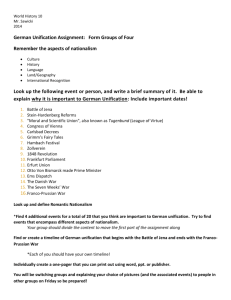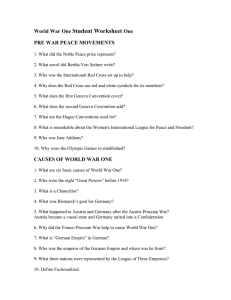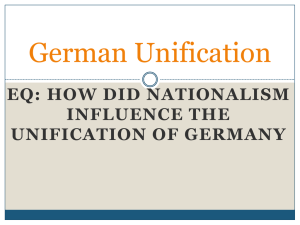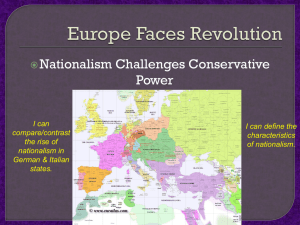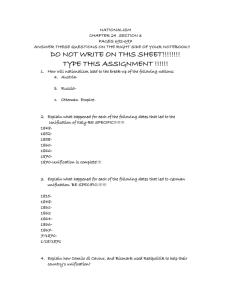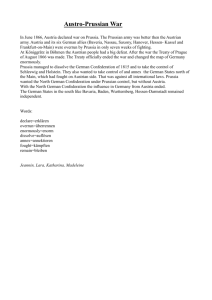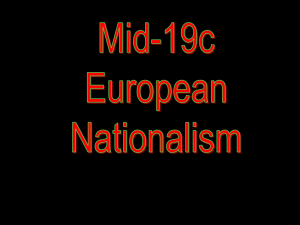Unification of Germany - Boise State University
advertisement
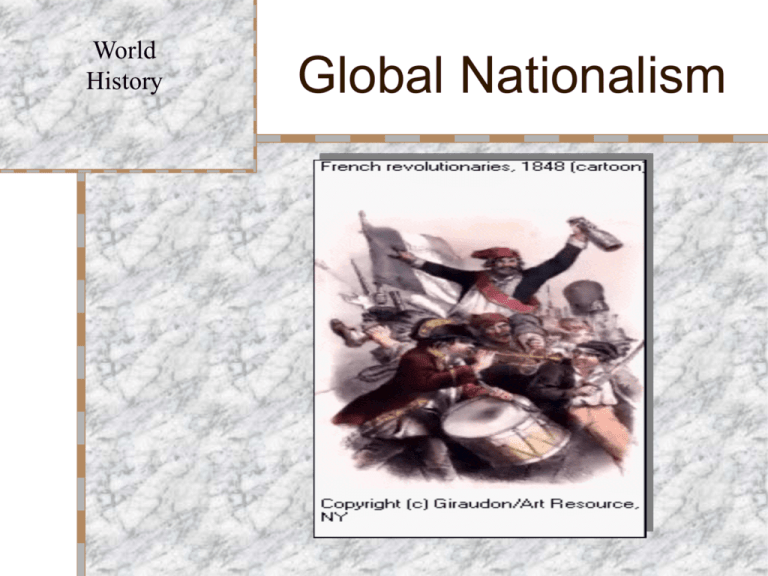
World History Global Nationalism Why did nationalism rise? Europe • Common cause against an uncertain future (unification) • self determination (independence) Non-Western (India, SE Asia, etc.) • Educated native elite sent to Europe to study • brought back nationalist views • became leadership of independence movements Otto von Bismarck, 1815-98. Premier of Prussia (1862-90), chancellor of Germany (1871-90). To expel Austria from German Confederation (as a first step toward unification of the German states), provoked war with Denmark and then Austria (1864-1866) over the SchleswigHolstein question. AUSTRO-PRUSSIAN WAR--1866 • quick defeat of Austria (aka Seven Weeks War) • Bismarck formed the North German Confederation without Austria and with Prussian leadership FRANCO-PRUSSIAN WAR 1870-71 • Exploited German states’ fears of France to ally with Prussia • France humiliatingly defeated, AlsaceLorraine annexed Used notion of united Germany as catalyst for all of these actions. Now easily brought German states under crown of Prussia William I proclaimed German emperor Bismarck empire's first chancellor-ruled thereafter as virtual dictator. aka “The Iron Chancellor” Architect of the German Empire Credited with the 1871 unification of Germany Was warned against taking the provinces of Alsace-Lorraine from France after the 1870 Franco-Prussian War (led to WW I) Was warned against the violation of Belgian neutrality as dictated by the von Schlieffen Plan for the invasion of France Had difficulty winning approval of alliance with Austria-Hungary (Wilhelm I was worried it would offend Russia) Dismissed as Chancellor by Wilhelm II in Mar-1890 His system of alliances made him the acknowledged leader of Europe (THREE EMPERORS' LEAGUE; TRIPLE ALLIANCE AND TRIPLE ENTENTE) His alliances proved difficult for his successors to manage. Non-Western Nationalism India Indian Turkey Young National Congress, Muslim League Turks Trend in country is to send promising students to Europe for education. Returned to India to lead nationalist movements such as Indian National Congress (Hindu) and Muslim League (Muslim). Excerpts from The Young Turks: Proclamation for the Ottoman Empire, 1908 1. The basis for the Constitution will be respect for the predominance of the national will. One of the consequences of this principle will be to require without delay the responsibility of the minister before the Chamber, and, consequently, to consider the minister as having resigned, when he does not have a majority of the votes of the Chamber. 2. Provided that the number of senators does not exceed one-third the number of deputies, the Senate will be named as follows: one-third by the Sultan and two-thirds by the nation, and the term of senators will be of limited duration. 3. It will be demanded that all Ottoman subjects having completed their twentieth year, regardless of whether they possess property or fortune, shall have the right to vote. Those who have lost their civil rights will naturally be deprived of this right. 4. It will be demanded that the right freely to constitute political groups be inserted in a precise fashion in the constitutional charter, in order that article 1 of the Constitution of 1293 A.H. [Anno Hegira=] be respected. 7. The Turkish tongue will remain the official state language. Official correspondence and discussion will take place in Turkish. 9. Every citizen will enjoy complete liberty and equality, regardless of nationality or religion, and be submitted to the same obligations. All Ottomans, being equal before the law as regards rights and duties relative to the State, are eligible for government posts, according to their individual capacity and their education. Non-Muslims will be equally liable to the military law. 10. The free exercise of the religious privileges which have been accorded to different nationalities will remain intact. Source. From: "The Young Turks," trans. A. Sarrou, in Civilization since Waterloo, Rondo Cameron, ed. (Paris, 1912), pp. 40-42 Scanned by Jerome S. Arkenberg, Cal. State Fullerton. The text has been modernized by Prof. Arkenberg. http://www.fordham.edu/halsall/mod/1908youngturk.html Zionism Zionism, the national movement for the return of the Jewish people to their homeland and the resumption of Jewish sovereignty in the Land of Israel, advocated, from its inception, tangible as well as spiritual aims. Jews of all persuasions, left and right, religious and secular, joined to form the Zionist movement and worked together toward these goals. Disagreements led to rifts, but ultimately, the common goal of a Jewish state in its ancient homeland was attained. Balkans before World War I – Many new nations (Serbia, Greece, Romania, etc) recently independent from Ottoman Empire, Austro-Hungarian Empire. – Made alliance with great powers of Europe (GB, Russia, Germany, France). – Tensions in region led to WW I. Global Nationalism QUESTIONS?
